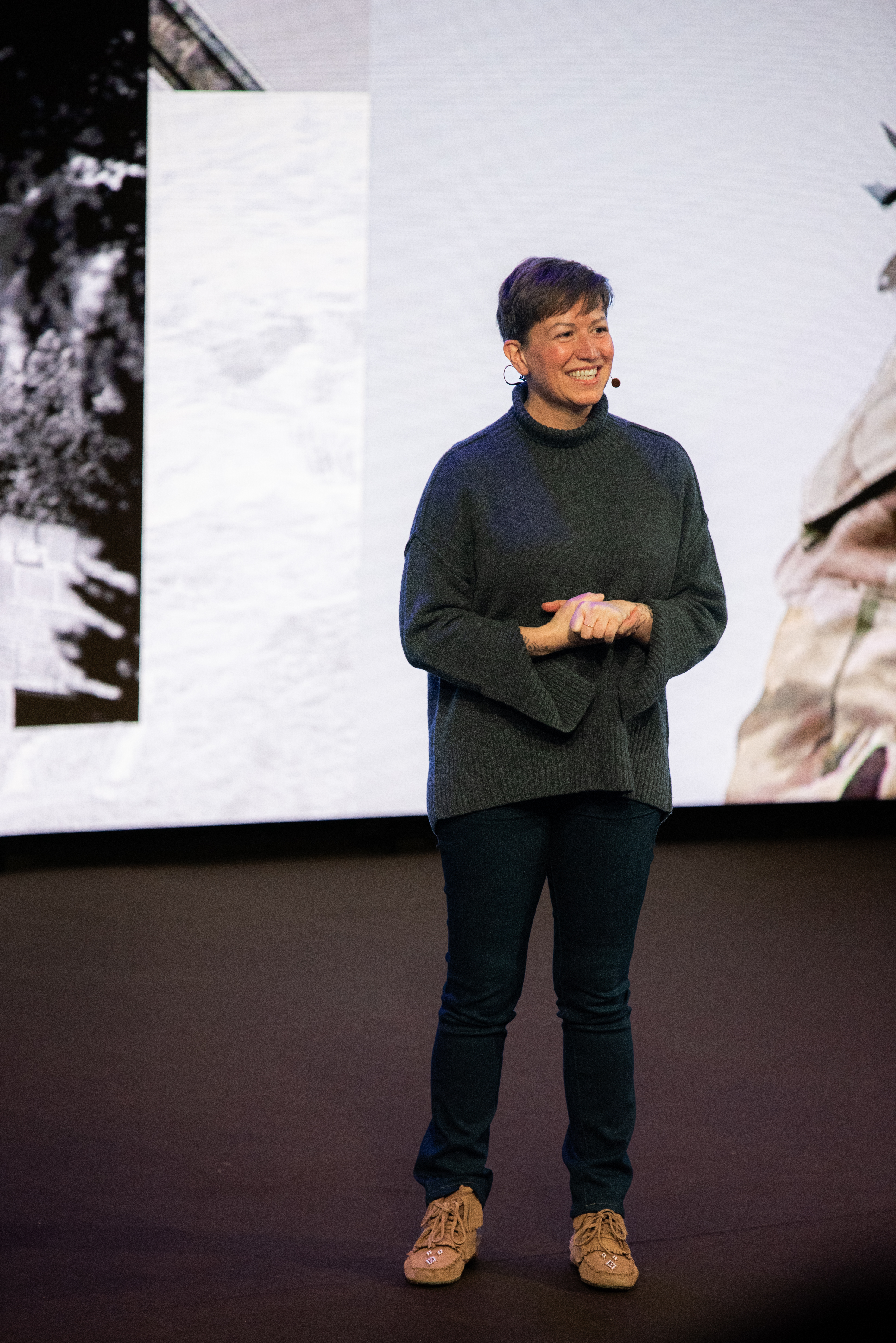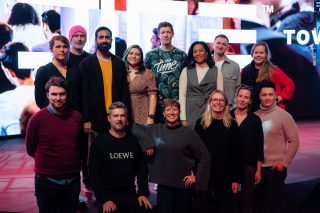Celebrating Female Leadership in Gaming With Charity Joy
The General Manager of Criterion shares her journey and vision for shaping the future of gaming leadership


For Women's History Month, we continue our series, celebrating the contributions of some of the women leading our studios. In this piece, we speak with Charity Joy, General Manager of Criterion Games, who embodies the spirit of innovation and leadership. Here, she shares her journey, insights, and vision for the future of gaming.
From Producer to General Manager: A Journey of Evolution
Charity's journey at EA began in June 2021 as a senior producer supporting UFC, but her foray into gaming began in 2006. Over time, her role has evolved, reflecting on her journey. Charity notes pivotal moments in her career.
Q: Tell us about your background in games
“I started in game development in 2006 as part of a game start-up. I didn't grow up with video games – they weren't allowed in our home, other than Tetris on the Game Boy and one experience with Duck Hunt.
But I was invited into this little start-up where we were building a web-based MMO for kids. The internet was kind of seen as a scary place for kids at the time, and we were trying to create a safe space. That was my first foray into games, and that start-up was acquired by the Walt Disney Company in 2007. So, then I spent ten years working for Disney and leading that Canadian development studio as a creative lead on that project and then as the co-GM of the studio.
I stepped away from games for about five years and did my MBA because I wanted to balance the creative side with the business side. I got certified as a coach, worked more with tech entrepreneurs, and got involved in a tech start-up in Montreal in the health tech space. Then I decided to focus on leadership development, started a coaching practice, and then was recruited by EA back into game development.”
Q: Tell us about some milestones since you’ve been back at EA
“There are a couple, I would say. I come from an MMO and mobile development background, and UFC 5 was my first HD title. It was fun because UFC 5 was also the first time UFC went out as a mature-rated game and also the first time we really focused on live services. So I feel really proud of that.
Additionally, moving my whole life to the UK to lead the Criterion Games Studio has certainly been a memorable milestone. And now supporting two franchises out of here is pretty fun.”
Pioneering Female Leadership: Shaping the Future of Gaming
Diversity and inclusivity are at the forefront of Charity's vision for the gaming industry. While acknowledging the progress made in promoting female leadership, she emphasizes the need for continued efforts to ensure representation at all levels of the organization.
Q: How do you perceive the role of women in shaping the future of EA? Particularly within your studio.
“When I joined EA, it was really encouraging to see the number of women in senior leadership positions and in every business unit – whether you're in product development, brand, commercial, finance, human resources, or business development, I keep running into great women everywhere I am. I think that that's really important and has been encouraging, but I think it's something we need to continue to keep an eye on when it comes to our succession planning and our recruitment pipelines.
Q: How do you foster a supportive and inclusive environment for your team?
“I'm a big believer that game development is a team sport. You're bringing together everyone – finance, law, engineering, artists, game designers, writers – a lot of different personalities. So, we spend quite a bit of time making sure that we have open and transparent communication and that we are clear in our roles and responsibilities. People need to know how they can contribute in a way that's meaningful.
I'm a big believer that nobody is just one thing. You come into a company with so many transferrable skills and ideas that can have a positive impact on other areas of the company. And I think if we can create spaces where we can get that out of people, we're going to have even more great ideas and good outcomes.
So, in our studio, we have a weekly Monday morning meeting for the entire studio with celebrations of birthdays and milestones, as well as updates on what's going on in the studio that week. It's just a show and tell – does anyone have anything they've been working on that they want to share? Even if it's personal projects, they build that sense of community across our two studio locations and for fully remote folks throughout Europe and North America.
We also have regular ask-leadership sessions in the studio and a monthly internal loop group with members from each of our craft disciplines and different models of working represented so we can close loops with dialogue and feedback back from the team.
And, you know, I'm not that old, but I'm starting to notice different generations and their communication styles – what they expect out of work and what they expect out of leaders. Being able to understand and adapt to that was really important. So that's amazing.”

Embracing Curiosity: The Power of Generalism in Gaming
Charity's career is a testament to the value of curiosity and adaptability. In an industry that thrives on innovation, being a generalist has been a strength rather than a limitation. She encourages aspiring women in gaming to embrace their curiosity and see it as a pathway to growth and innovation.
Q: You've amassed diverse knowledge over the span of your career, and now you're in this space where you get to apply all of it perfectly. Can you share how being a generalist has turned you into a unique type of specialist?
“Coaches and business leaders love to say, ‘You have to find your purpose and focus; you need to get your 10,000 hours.’ It is very much a specialist-focused message. I used to feel bad that my curiosity would take me to a point, and then I would lose interest, and then I would be curious about the next thing, and then I would get good enough but not really master something, and then move on to the next thing. (You should see how poorly I play many instruments.) And I've seen now, in hindsight, that what I do have is an expertise in curiosity and an ability to learn. I would say I also have expertise in my ability to try new things.
And I think those areas of expertise are what have allowed me to be a great generalist. When I don't know something, I'll go find out because I'm curious and it's interesting. If there's a new challenge and I have an opportunity to try, I'll try.
I would not have been able to articulate that ten years ago, but when I look at where I am now, I actually stand in those traits as a foundation of confidence, and I remind myself of those things when I have a new challenge or a new opportunity that's in front of me.
A generalist life in this role is never boring. It's a fun balance of the people, the product, the business, the process, and the players; you can touch a little bit of all of it and really bring it together into something that is meaningful, something that's meaningful to your team, something that's meaningful to our players, something that has a meaningful impact to the business.”
The Evolution of Gaming: Looking Ahead
Reflecting on her 18 years in the industry, Charity highlights the significant changes in gaming, from technological advancements to shifting player demographics. As gaming continues to evolve, she envisions a future where interactive experiences blur the lines between linear and interactive media, ushering in an era of unprecedented creativity and engagement.
Q: What changes have you seen in your gaming career, and how do you see the future of the industry evolving?
When I started in gaming, Facebook had just come out. We were building in Flash for the web. There was no iPhone; there was no App Store. We were doing a subscription model in 2006. No one else was looking at the subscription model. Now, how many subscriptions do you have?
The business models have changed a lot, technology has changed a lot, and I would say the idea of what a game is has changed a lot. And the demographics have changed a lot. I think about game design and when you used to grind through levels to a win state with no save. If you didn't make it, you started over from the beginning. I don't think anyone has patience for that nowadays, and that's not how we design.
At the end of the day, we're just trying to create fun and engaging experiences for people. And I do think that the definition of games will continue to evolve as technology allows experiences to be more connected and interactive. And I am excited to see what the next generation of talent brings to the industry and the craft.
A Vision for the Future
Charity's journey epitomizes the spirit of female leadership in gaming—driven, innovative, and inclusive. As she continues to lead Criterion Games into the future, her insights and experiences serve as inspiration for aspiring leaders of all genders, paving the way for a more diverse and dynamic gaming industry. For aspiring leaders, she advises to “always be curious and to see the things that you don't know as potential strengths.”
In an ever-changing landscape, one thing remains constant: the transformative power of leadership. And in Charity Joy, gaming has found a visionary leader poised to shape its future for years to come.
Check out open roles at Criterion Games and EA to join our dynamic team!

